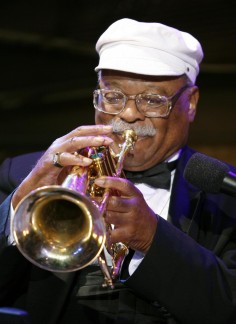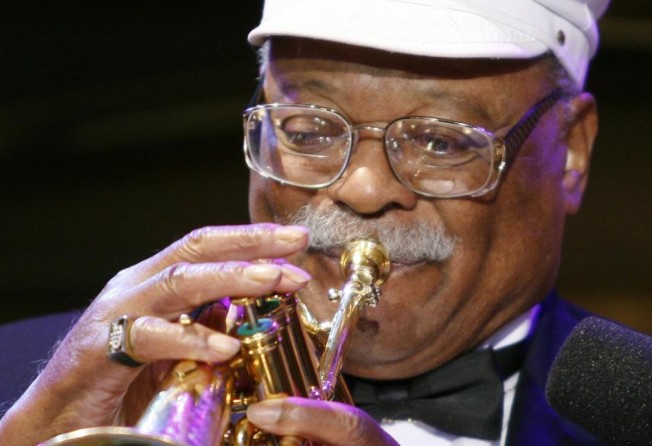
Clark Terry, pioneering jazz trumpeter, remembered

In Richard Cook's Jazz Encyclopedia, the entry for one of the greatest trumpeters of the 20th century begins: "Nobody ever says a bad word about Clark Terry."
Terry, one of the greatest and best-liked of jazz musicians, died on February 21 aged 94. During a performance last month at Grappa's Cellar, Georgie Fame dedicated Yeh Yeh to Terry, noting that he first heard the song on a live recording made by Lambert, Hendricks and Bavan at the Newport Jazz Festival in 1963. Terry played on that version, and was also at Newport in 1956 with Duke Ellington.

He was important as a featured soloist and as an ensemble player in Count Basie's band - from 1948 to 1951 - and with Ellington from 1951 to 1959. The Duke poached him from the Count.
A swing-era player who was comfortable with bebop and other styles, Terry sounded like himself at all times. He was adaptable to almost any musical situation.
He became the first African-American to join the band for a US national TV network - performing on Johnny Carson's Tonight Show on NBC between 1962 and 1972.
He also had noteworthy musical affiliations with Bob Brookmeyer, Oscar Peterson, J.J. Johnson and Quincy Jones, among many others. Terry became increasingly involved in jazz education as he grew older, but started informally by passing on trumpet tips to the young Miles Davis and Jones.
In his early years, Davis said that Terry, six years his senior, was his "idol on the instrument" and later when the two became friends, Terry would adjust the valves on his trumpets for him. No one else, he believed, could set a horn up so well. Davis also recalled lending Terry his flugelhorn occasionally, and believed that was what got him interested in the instrument. In his autobiography he described Terry as "one of the best in the world at playing it, if not the best".
Their friendship was so strong that during his period of heroin addiction, Davis stole some of Terry's belongings, including clothes and a trumpet to pay for a score, and Terry simply forgave him.
As well as excelling on trumpet and flugelhorn - which he would occasionally play upside down - Terry developed a distinctive approach to scat singing, best exemplified by Mumbles, a composition which first appeared on a 1964 album called the Oscar Peterson Trio + One, on which he guested on flugelhorn, trumpet and vocals. Over time, Mumbles became both a signature tune for him and the basis for some stage comedy.
Terry also liked to play duets with himself, alternating between trumpet and flugelhorn, and to play solos using only a mouthpiece. He was a notable composer and bandleader, and although failing health in later years meant he could no longer perform, he continued to encourage young musicians.
His last mentorship was to 23-year-old blind pianist Justin Kauflin, and a documentary filmed over four years recording that friendship, titled Keep On Keepin' On and produced by Jones, was screened at last year's Tribeca Film Festival.
Terry enjoyed a long life, but he could easily have been lost to the world as a teenager. While playing in a carnival show band, he was beaten senseless in a racially motivated attack and narrowly escaped being lynched. However, he survived to make indelible contributions to the world both as an artist and as a human being. RIP.
Meanwhile, a highlight of the Hong Kong Arts Festival for jazz lovers will be Bobby McFerrin's performances from his 2013 album Spirityouall this Friday and Saturday. Spirityouall is a tribute to his father, Robert McFerrin Snr, who in 1955 was the first male black American singer to perform at the Metropolitan Opera House in New York. He also sang spirituals, and for this project McFerrin Jnr mixed up a selection of the songs on his father's 1957 album, Deep River, with his own original compositions, and Bob Dylan's I Shall Be Released.
There are strands of jazz and Americana interwoven with the spirituals in artful arrangements by Gil Goldstein.
McFerrin is a compelling performer. It will be interesting to hear how the music sounds live.
Take Three
Three of the best albums recorded by Clark Terry as a leader.
- In Orbit (1958, Riverside): Terry had appeared on Thelonious Monk's classic 1957 album, Brilliant Corners, playing on Bemsha Swing, and here the favour is returned. He also contributed his composition Let's Cool One to the session.
- Color Changes (1960, Candid): a strong contender for Terry's finest album as a leader, this is an octet set on which he plays both trumpet and flugelhorn, as well as composing four of the seven tunes.
- Memories of Duke (1980, Pablo): one of the finest Ellington tribute collections, performed by a small group comprising Terry on trumpet, Joe Pass on guitar, Ray Brown on bass, Jack Wilson on piano, and Frank Severino on drums.